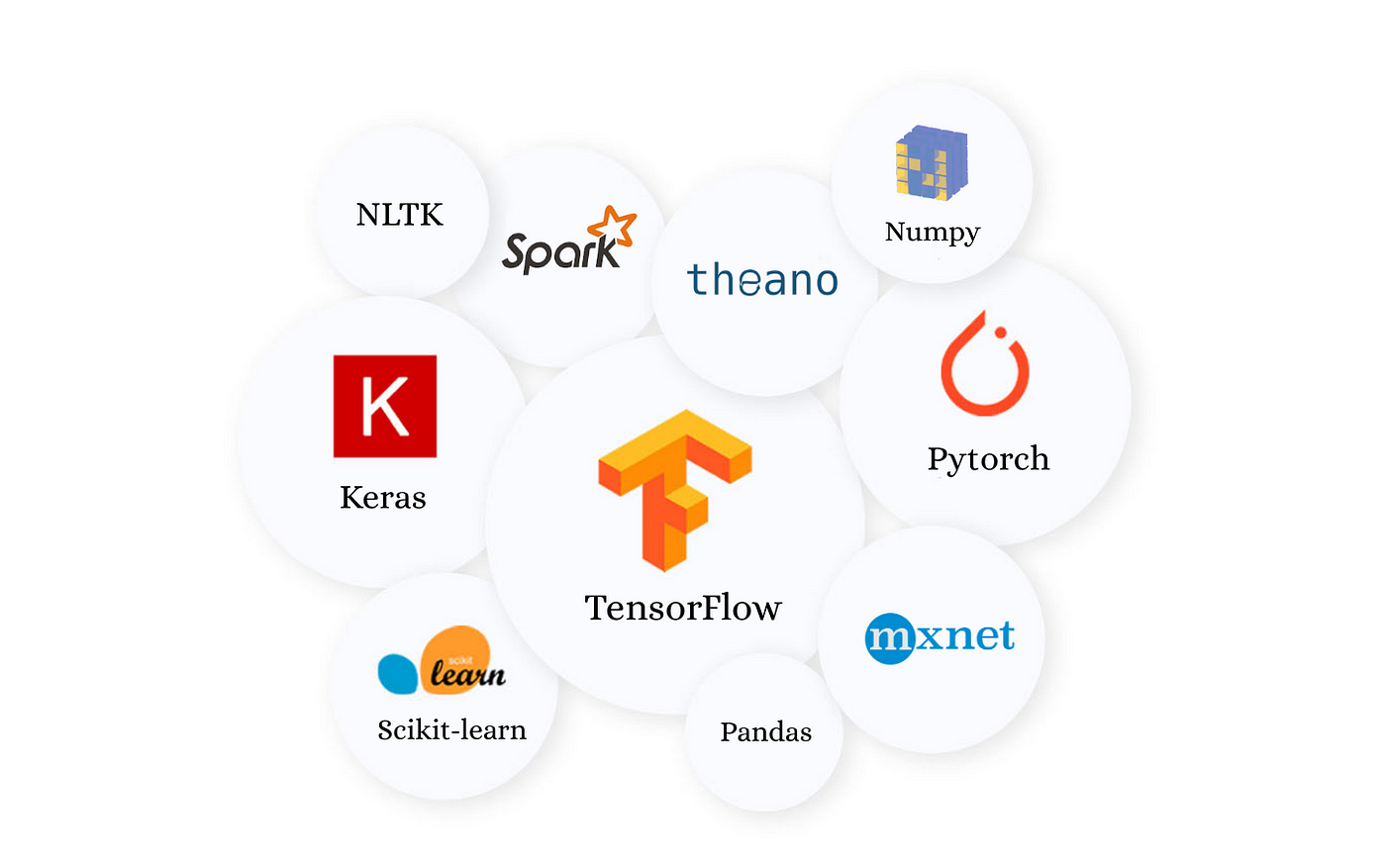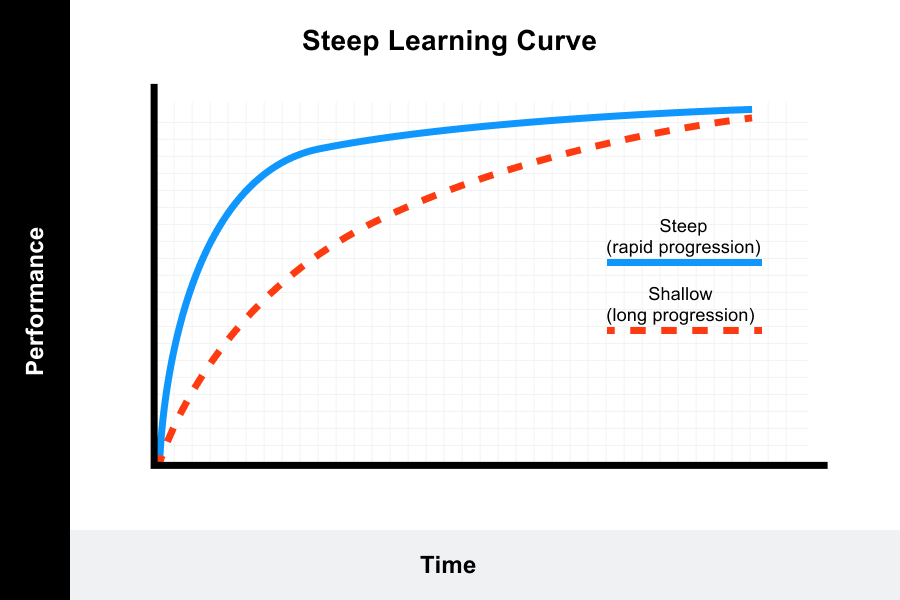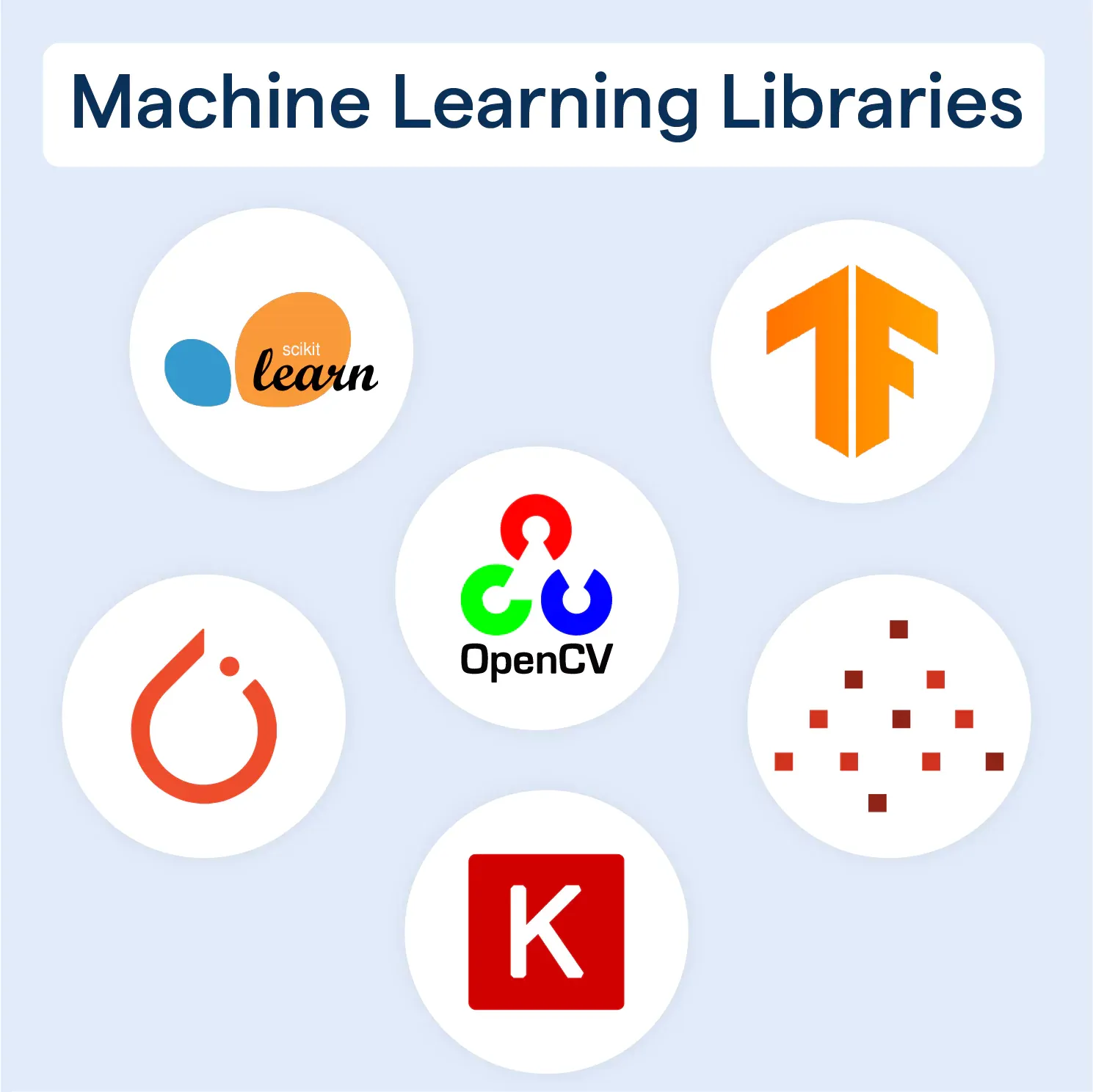What are Machine Learning Libraries?

Machine learning libraries are collections of pre-built tools, algorithms, and functions that simplify the process of developing and implementing machine learning models. They save time and effort by providing ready-to-use implementations of common machine learning techniques.
Essential Components
Machine learning libraries typically consist of a few essential components:
- Data preprocessing: Tools for handling data, such as for cleaning, normalization, feature extraction, and dimensionality reduction.
- Model training: Algorithms for training various machine learning models like linear regression, neural networks, and decision trees.
- Model evaluation: Metrics and techniques to assess the performance of the model, such as accuracy, precision, recall, and confusion matrix.
- Optimization and regularization: Methods for fine-tuning model parameters, including gradient descent and techniques like Lasso or Ridge regularization.
- Model deployment: Capabilities for deploying trained models in real-world applications, such as APIs, web services, or integrating into existing systems.
Benefits of using Machine Learning Libraries
Utilizing machine learning libraries offers several advantages, such as:
- Efficiency: They often have optimized implementations of algorithms, leading to faster execution and training times.
- Ease of use: They simplify the process of building and deploying models with user-friendly APIs and interfaces.
- Collaboration: They enable collaboration amongst researchers and developers by providing a common framework and language to work with.
- Pre-trained models: Some libraries include pre-trained models, which can be fine-tuned to solve specific problems, saving development time.
When to Use a Machine Learning Library?
You should consider using a machine learning library when:
- You're working on a problem that involves pattern recognition, prediction, or decision-making.
- You have a large dataset you want to analyze and draw insights from.
- You're collaborating with others on a machine-learning project.
- You want to speed up the development process and use pre-built components instead of building a solution from scratch.
Why are Machine Learning Libraries Important?
In this section, we'll discuss why machine learning libraries are vital components for developing powerful AI applications and streamlining computational tasks.
Facilitating Rapid Development
Machine learning libraries provide pre-built algorithms and models, enabling developers to implement complex ML functionalities with relative ease. This accelerates the development process by drastically reducing the time spent on standard tasks.
Encouraging Reusability
These libraries encourage code reusability since they often consist of modular and reusable components. This further promotes efficiency, as developers can repurpose existing components for various applications, expediting future projects.
Enhancing Collaboration
Machine learning libraries bridge the knowledge gap between ML experts and developers by providing a standardized set of tools and methodologies. This fosters collaboration between diverse teams and ensures that projects align with industry best practices.
Simplifying Complex Tasks
Machine learning libraries abstract away the underlying complexities associated with ML development. By offering high-level APIs and functions, these libraries simplify the execution of even the most intricate tasks, allowing developers to focus on the core logic of their applications.
Promoting Community Support
An extensive support network often backs popular machine learning libraries. This community provides invaluable resources like forums, tutorials, and workshops, facilitating problem-solving and enhancing developer proficiency.
How Do Machine Learning Libraries Work?
In this section, we'll unpack how machine learning libraries function, the cornerstone tools for performing complex machine learning tasks such as data analysis, model building, training, and prediction in a simplified and efficient way.
Provide Versatility
Machine learning libraries provide a range of pre-built algorithms, memory management features, and data structures for versatility in handling various tasks, like classification, regression, clustering, dimensionality reduction, and more.
Assist Data Preprocessing
These libraries play a significant role in preprocessing data. They offer functions to handle missing data, encode categorical variables, normalize numerical values, and split datasets into training and testing subsets, optimizing them for machine learning algorithms.
Offer Machine Learning Algorithms
Machine learning libraries encapsulate complex algorithms into easy-to-use functions. These algorithms handle tasks such as supervised learning, unsupervised learning, and reinforcement learning, among others.
Facilitate Training and Validation
They offer functionalities to train models with variant techniques, like batch learning or online learning. Also, these libraries support features like cross-validation, facilitating models' evaluation and ensuring they generalize well.
Aid in Hyperparameter Tuning
These libraries provide functionalities to tune hyperparameters, instrumental in improving the predictive accuracy of a model. Grid search or randomized search options in these libraries allow iterating over multiple combinations of hyperparameters.
Facilitate Model Evaluation and Prediction
Finally, machine learning libraries help in assessing a model's performance through several metrics and making predictions on unseen data.
By leveraging machine learning libraries, professionals can focus more on the problem-solving aspects rather than the technical details of the underlying algorithms.
Popular Machine Learning Libraries
Let's take a closer look at some of the most popular machine learning libraries:
- Numpy: A fundamental library for scientific computing in Python, providing support for multi-dimensional arrays and mathematical operations.
- Pandas: A powerful data manipulation and analysis library, ideal for data preprocessing and exploration.
- Scikit-Learn: A versatile library for machine learning in Python, offering a wide range of algorithms and tools for model training and evaluation.
- Statsmodels: A library for statistical modeling and econometrics, useful for advanced statistical analysis.
- Regular expressions (regex): A tool for pattern matching and text parsing, widely used in data preprocessing tasks.
- NLTK (Natural Language Toolkit): A library for natural language processing, facilitating tasks like text classification and sentiment analysis.
- Tensorflow: An open-source library for deep learning, known for its flexibility and scalability.
- PyTorch: A widely used deep learning library with dynamic computational graphs and intuitive APIs.
- Armadillo: A C++ linear algebra and scientific computing library with a user-friendly syntax.
- FANN: A library for artificial neural networks, providing fast and scalable implementations.
- Keras: A high-level deep learning library that runs on top of TensorFlow, simplifying deep learning model implementation.
- OpenNN: An open-source neural networks library, offering various architectures and algorithms.
- Shogun: A machine learning toolbox with interfaces for multiple programming languages and a vast collection of algorithms.
- Theano: A library for numerical computation in Python, optimized for deep learning tasks.
Challenges with Machine Learning Libraries
Machine learning libraries, though indispensable tools for developing AI applications, present a range of challenges. recognizing these challenges can lead to more effective problem-solving and better use of ML resources.
Compatibility Issues
Machine learning libraries depend heavily on compatibility between different software versions and packages. Mismatches in versions or incompatibility with certain operating systems can lead to issues, ranging from faulty functionality to complete breakdowns.
Steep Learning Curve

While machine learning libraries can automate complex tasks, getting up to speed with a library can be a daunting task, especially for beginners. Each library has its unique syntax, functions, and quirks, requiring considerable time to learn.
Insufficient Documentation
Adequate documentation is crucial for understanding library functionalities. However, sparse, outdated, or poorly explained documentation often compounds the steep learning curve, making it difficult for newcomers to navigate the library.
High Computational Requirement
Machine learning libraries typically have high computational requirements due to their intensive tasks. They often need high-powered hardware for efficient processing, placing a significant demand on resources, which can prove challenging for small-scale projects or organizations.
Limited Customization Options
Lastly, while machine learning libraries provide pre-defined algorithms and models that facilitate rapid prototyping, this convenience often comes at the expense of customization. Libraries may not offer the flexibility required for tasks necessitating highly tailored solutions, limiting their utility in such scenarios.
Machine Learning Library Best Practices
In this section, we'll cover the best practices when using machine learning libraries – essential tools for data analysis, cleaning, visualization, model training, and prediction.
Understanding your Data

Before utilizing any machine learning library, a deep understanding of the data one is working with is paramount. Familiarize yourself with the dataset's distribution, outliers, and correlations among features in the data.
Choosing the Right Library
There are numerous machine learning libraries, such as scikit-learn, TensorFlow, PyTorch, and Keras. Choosing the right one depends on your specific use case, the learning algorithms you need, the available computational resources, and your familiarity with the library's syntax and conventions.
Preprocessing Data
Most machine learning libraries require data in a certain format. Preprocessing your data - such as normalizing numerical data, encoding categorical data, handling missing values, and feature scaling - becomes a crucial step towards ensuring your library functions properly.
Training with Cross-Validation
It's a best practice to prevent overfitting by using cross-validation during the model's training phase. Libraries like scikit-learn have built-in functionality for creating training and validation splits of your dataset.
Hyperparameter Tuning
Fine-tuning hyperparameters can significantly improve model performance. Libraries like GridSearchCV in scikit-learn can automate this process by systematically searching through a grid of hyperparameters and finding the optimal combination.
Model Evaluation
Use the right metrics to evaluate your model. Different libraries offer different evaluation metrics such as precision, recall, F1-score, ROC curve, etc. Select the one that aligns best with your business goals and problem at hand.
Keeping Up-to-Date
Machine learning libraries are updated frequently with enhancements, bug fixes, and new feature additions. Ensuring you're using the most up-to-date library version can help you maximize efficiency and accuracy in your machine learning projects.
Frequently Asked Questions (FAQs)

What are some popular machine learning libraries available?
Some popular machine learning libraries include scikit-learn, TensorFlow, PyTorch, Keras, and XGBoost.
How do I choose the right machine learning library for my project?
Consider factors such as compatibility, performance, ease of use, available functionalities, community support, and documentation quality to choose the most suitable library.
Can I use multiple machine learning libraries together?
Yes, it is possible to use multiple libraries together based on your project requirements. You can leverage the strengths of different libraries to enhance your machine learning workflow.
How can I ensure compatibility with different versions of a library?
Stay updated with the library's documentation and release notes, and test your code on different versions to identify and address any compatibility issues.
Are there any limitations or challenges associated with using machine learning libraries?
Yes, some challenges can include complexity in hyperparameter tuning, data preprocessing, ensuring model interpretability, and deployment in production environments. Proper understanding and best practices can help overcome these challenges.

